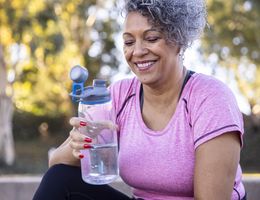Health library
Back to health libraryDrink up! Making sure you get enough water

To keep your body healthy and working properly, you need to make sure to drink enough liquids. It's especially important to drink enough when you're exercising or when it's hot out.
If you were a glass of water, you'd be more than half full.
At least, you should be.
Water makes up more than 50% of your body. Three-quarters of your muscle tissue and 10% of your fatty tissue are composed of water, according to the American Council on Exercise (ACE).
But your water content isn't a constant: You lose water with a number of different activities every day, especially when exercising and during warmer weather.
To stay hydrated, you need to be sure that you take in as much water as you lose.
Why water is important
Since your body is mostly water, you obviously can't live without it.
It protects your organs and helps your digestion. Your body's cells need water to transport nutrients and get rid of waste.
Perhaps most important, water regulates your body temperature through sweat. When you get hot, sweating cools you down.
According to ACE, you can sweat away more than a quart of body water in one hour of physical activity.
That's good news and bad news. The good news is that sweating during exercise probably means you're getting a good workout, which is healthy. The bad news is that you'll become dehydrated if you aren't replacing the water you're losing. That's not healthy.
The dangers of dehydration
Like a car with an empty radiator, a dehydrated body becomes overheated. Although smoke won't start billowing from the top of your head, you are putting yourself at risk for:
Heat cramps. These are painful muscle contractions, often in the abdomen, arms or legs.
Heat exhaustion. This is the body's response to an excessive loss of water and salt. It can cause symptoms such as heavy sweating, extreme weakness, dizziness, irritability and nausea.
Heatstroke. This is the most serious heat-related disorder, according to the Centers for Disease Control and Prevention (CDC). It can cause death or permanent disability if not treated right away. During heatstroke, body temperature rises rapidly, sweating stops, and the body is unable to cool down. According to CDC, symptoms include:
- Hot, dry skin or extreme sweating.
- Coma.
- Seizures.
- Extremely high body temperature.
- Confusion.
- Slurred speech.
Stay hydrated, stay healthy
Most people can let thirst be their guide to staying hydrated, according to the Health and Medicine Division of the National Academies of Sciences, Engineering, and Medicine.
But thirst is a sign that you're already on the way to dehydration, according to ACE. To stay healthy, you may need to do more than just quench your thirst.
Drink water throughout the day. Even if you aren't exercising or the weather isn't warm, it's a good idea to drink water throughout the day. The Health and Medicine Division recommends around 91 ounces a day for women and around 125 ounces daily for men. Keep in mind that this includes water from foods such as fruits, vegetables and soups as well as from beverages such as water, juice, and even coffee and tea.
Drink extra when you exercise. ACE offers these guidelines:
- Drink 17 to 20 ounces of water two hours before exercise.
- Drink 7 to 10 ounces of fluid every 10 to 20 minutes during exercise.
- Weigh yourself before and after workouts. Drink 16 to 24 ounces of fluid for every pound you lost during exercise.
Water isn't your only option. Sports drinks often include necessary nutrients such as electrolytes and carbohydrates, which can be helpful after an hour or more of exercise. Keep in mind, however, that these products aren't calorie-free.
Other tips to stay hydrated include:
- Drink small amounts often instead of large amounts rarely.
- Drink cold beverages to cool your body down.
- Watch for small amounts of urine or dark-colored urine, which can be a sign you aren't drinking enough water.
A note for long-distance runners
People who participate in marathons, triathlons or race walking should be aware of the risk for hyponatremia, a low level of sodium in the blood that can occur as a result of drinking too much water. To stay hydrated and reduce the risk of hyponatremia, runners should drink enough to replace the fluids lost during exercise and should let thirst be their guide, according to ACE.
For more information on how much water to drink during your exercise routine, talk to a healthcare professional.
Reviewed 7/25/2025
Sources
- American Council on Exercise. "Exercising Safely on a Warming Planet." https://www.acefitness.org/continuing-education/certified/may-2022/8085/exercising-safely-on-a-warming-planet/.
- American Council on Exercise. "Fit Facts: Healthy Hydration." https://acewebcontent.azureedge.net/assets/education-resources/lifestyle/fitfacts/pdfs/fitfacts/itemid_2639.pdf.
- Centers for Disease Control and Prevention. "Get the Facts: Data and Research on Water Consumption." https://www.cdc.gov/nutrition/php/data-research/fast-facts-water-consumption.html.
- Centers for Disease Control and Prevention. "Heat Stress." https://www.cdc.gov/niosh/topics/heatstress.
- National Academies. "Dietary Reference Intakes for Water, Potassium, Sodium, Chloride, and Sulfate." https://nap.nationalacademies.org/catalog/10925/dietary-reference-intakes-for-water-potassium-sodium-chloride-and-sulfate.
- U.S. Geological Survey. "The Water in You: Water and the Human Body." https://www.usgs.gov/special-topics/water-science-school/science/water-you-water-and-human-body.
